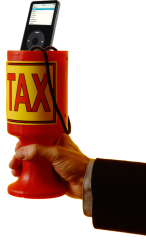University music tax: sharing and caring?


I'd let that sink in for a minute.
There have been calls from far and wide to regulate illegal music downloads by university students; using an academic network to illegal obtain files (which is probably part of the original constitution anyway; we all know Washington loved his iPod) has resulted in arrests (well, lawsuits anyway) of many university students in the United States.
Not to mention, I wrote about the legal vs. illegal downloading of music some months ago, and whilst I don't condone illegal behaviour, I came to the sound conclusion that if you could get away with downloading music illegally, then go for it, but solely at your own risk. That certainly got some controversy, and I'm off the lawyer's Christmas card list this year.
The Warner Music Group have proposed an "tax" which includes a small fee in part of the tuition fees paid to the university, which goes towards a blanket licence which is applicable to every student in the university. This would enable students to download music how they want to, regardless of whether it's through Torrents, Rapidshare, browsing iTunes or browsing other people's iTunes; regardless of which method of download is used, the artists will still get a cut. It may not be the cut they'd get had they sold their music directly, but it's better than nothing.
The institutions collect the payments, which would be an extra few dollars on top of tuition fees anyway, and that pot of money is handed to an intermediary to then fairly distribute it to the artists, like handing out Christmas presents at an orphanage.
So, not only does this make every element of illegal music downloading totally legal, with no DRM and little restriction. Universities and students won't be hauled out of their beds at 3am and interrogated because they have a drunken craving for Barry Manilow. And finally, it gives back to the artists who are whinging on piracy when it's their lot who are jacking up the price so high, the rest of us just lose interest. Let's face it; James Blunt just isn't that good.
Although this hasn't been set in stone yet, there are still many details which need to be ironed out for this to work. I'm confident this will be a positive step forward in the process of "semi-legal-but-actually-perfectly-morally-acceptable" downloading. We're taking the mess with the amount we illegally download, and yes, it's convenient and quick, but this new solution would make it so much cheaper overall.
To be honest, I'd be surprised if any of this made sense considering I have a fever spiking at 102°. If so, please leave a comment; this could be an interesting one.
[poll id=11]